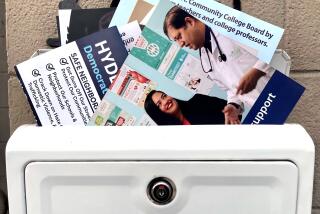Gmail is target of new Microsoft privacy campaign against Google
- Share via
SAN FRANCISCO -- Microsoft Corp. is taking another swipe at Gmail with a campaign to encourage people to dump Gmail for Outlook.com over privacy concerns.
The Redmond, Wash., technology giant is drawing new attention to an old issue: Gmail scans the content of personal emails in order to better target ads. Microsoft is pushing a new poll it commissioned that found that nearly 9 in 10 Americans disapprove of the practice. Seven in 10 Americans said they didn’t believe or didn’t know that any major email service provider did that, according to the poll.
Microsoft is using the poll results to bash its arch rival Google Inc. and promote its own email service. Microsoft scans email to filter spam or detect malware but says it does not scan email to target ads.
The practice of scanning emails to target ads has alienated some users since Gmail launched in 2004 despite repeated assurances from Google that it’s an automated process that looks for keywords to display relevant ads but does not invade their privacy. Complaints over the practice have been aired in recent litigation against Google.
“Advertising keeps Google and many of the websites and services Google offers free of charge. We work hard to make sure that ads are safe, unobtrusive and relevant. No humans read your email or Google account information in order to show you advertisements or related information,” Google said in a statement.
Gmail has become a prime target for Microsoft as more people gravitate to the service, which has surpassed Microsoft and is gaining on Yahoo. In 2011, Microsoft attacked Gmail with the parody video “Gmail Man.”
In December, Gmail began closing in on Yahoo as the No. 1 email provider. Yahoo had 78.7 million unique visitors, a year-over-year decline of 12%, according to research firm ComScore. Gmail had 76 million, a gain of 21%, and Microsoft trailed with 34.3 million, ComScore said. Microsoft has redesigned its email product Hotmail and rebranded the service Outlook.com.
Why does it matter? Free email services continue to be an important draw even as people rely more and more on messages on Facebook and Twitter or text messages on phones to communicate with family and friends. Such services keep people coming back, and when they are logged in, allow Internet companies to more easily track and tailor ads to their interests and tastes.
At the time that Gmail launched, there was controversy over whether Google should scan emails to target ads, but it simmered down. Recent lawsuits have argued that even though users accept the practice as part of Gmail’s terms of service, they don’t understand what they are agreeing to.
The Microsoft poll found that 9 in 10 email users said they thought email service providers should allow users to opt out of having their emails scanned for advertising purposes. Microsoft offers users the option of not being shown ads tailored to them for $20 a year, said Stefan Weitz, Microsoft’s senior director of online services.
“We feel that users should have options when it comes to how they pay for services,” Weitz said. “With Gmail, the only way to pay is with privacy.”
There are ways for Gmail users to opt out. They can sign up for a business account for $50 a year. They can use the HTML version of Gmail. They can also use the Gmail app on their iPhone and never see any ads in their inbox.
But the Microsoft campaign could pressure Google to offer users the option of not having their emails scanned to target advertising for a fee, said Danny Sullivan, founding editor of SearchEngineLand.com.
But even if Google gave users the option, he doesn’t think many people would pay for more privacy.
“While people in polls say they are concerned, in reality they are really not that concerned,” Sullivan said.
ALSO:
Gmail Man video mocks Google in the name of Microsoft
Microsoft thinks you are getting ‘Scroogled’ by Google
Microsoft criticizes Google’s proposed settlement with the FTC
More to Read
Inside the business of entertainment
The Wide Shot brings you news, analysis and insights on everything from streaming wars to production — and what it all means for the future.
You may occasionally receive promotional content from the Los Angeles Times.








